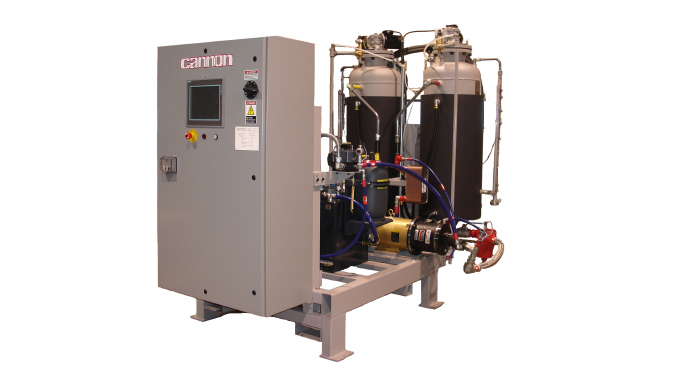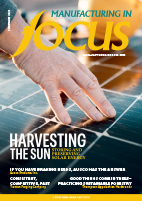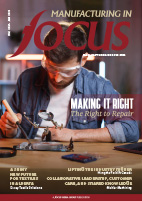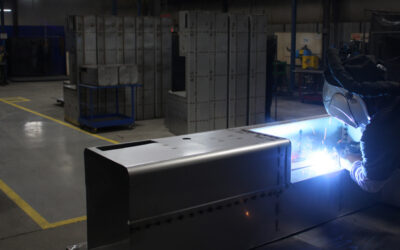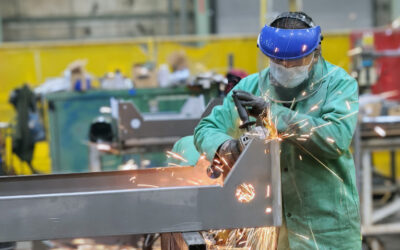Polyurethane and polymers – you can’t see them, but you should be happy that they are in everything from the cars we drive to the furniture we sit on – and even in the refrigerators that keep our food fresh. All have polyurethane in their actual material or use it to insulate and protect our food and houses.
Why is polyurethane such a sought-after material for manufacturing? According to how the chemical compounds are mixed together, the results could be either a rigid plastic or a soft foam. But making polyurethane takes work and the right machines to produce it.
When it comes to developing the specialized equipment, you would think that chemistry and engineering would come first. But if you talk to Marco Rigobello, Vice President of Sales and Marketing at Cannon USA, one of the country’s leading producers of polyurethane processing equipment, he will tell you it’s consulting with clients that’s the first step.
“The main way we achieve our innovations starts when we are brought in to consult with a customer,” Rigobello says. “We customize based on their needs and that can lead to something totally new. That comes from helping a customer find a solution.”
Headquartered just outside of Pittsburgh, Pennsylvania, Cannon USA has been in the business of finding creative solutions for customers who want to manufacture or process polyurethane since 1977. This includes processing equipment for low- and high-density polyurethane, epoxy and carbon fiber reinforced polymers. The company also produces mixing heads and all the ancillary equipment to process and store the chemicals.
Cannon USA is part of the larger Cannon Group of companies which has been headquartered in Italy since 1965 and has manufacturing locations around the globe. In the U.S., Cannon has carved out a reputation as a well-known supplier in the automotive industry.
“Because more car parts require the use of polymers, there is an increasing demand in the automobile industry,” Rigobello says of the company’s growth in the auto sector.
Polyurethane is not new in the industry and it has been used for many components, such as seat pads, steering wheels and bumpers. Nowadays its use is even more popular, because any part with a soft touch has PU in it and the demand for lightweight components involves the PU as the main binder. “The automakers adapted their design to make the vehicles more efficient and safer through polymers, and we have adapted as well.”
Beyond traditional polymers, Cannon USA is also actively involved in carbon fiber reinforced polymer (CFRP). The great thing with CFRPs is that they are extremely strong materials that at the same time are lighter than existing metallic parts. A crash course in chemistry tells us that CFRPs are formed through combining carbon fibers with an epoxy resin binder.
CFRP can be molded into the shape of a given product. And because it is both light and strong, there are all kinds of industries that use CFRP in their manufacturing processes, like automobile and aerospace (think F1 race cars and airframe structures). It is also useful in building materials because it can reinforce wood, concrete and steel structures.
Cannon USA makes the machines that can produce CFRP and other materials, covering all the steps from mixing to metering to molding. But you need to know what the client is solving for before you can offer a viable product.
“There are a number of ways we can help our customers,” Rigobello says. “One, they have fairly standard needs and we can provide them with a turnkey solution that we already have available. Two, they might need us to make a custom machine for them. That could mean developing the machine for the new application or for a new technology or a specialized application.”
Of course, you can’t just whip up this kind of sophisticated equipment without a high level of expertise. The team behind all these products is a group of engineers and technicians who are not just holed up in a design lab in the back of company headquarters; they are often on site with their clients throughout the design process.
“We are a flexible company, and we really succeed because we are able to customize our products according to customer requests,” Rigobello says. The approach is really about starting from scratch with every customer.
Rigobello is originally from Italy. He came to the U.S. as part of his MBA program (he also holds a Master’s degree in mechanical engineering and worked in the air conditioning business before extending his education). He then joined Cannon USA in 2012 after completing his program. “I thought it was going to be a couple of years of experience, but after almost eight years, I’m still here.”
What makes Cannon USA compelling to Rigobello is the pace and the innovation that takes place there. “The key is that we are quick, reacting to any request and being capable of customizing the product according to the client’s specifications.”
Being responsive and adaptable also means taking into consideration the impact on the environment, and this has led to making changes to reduce the energy consumption of the equipment the company produces. “We also try to find more efficiencies in our products. Our customers appreciate the savings and we end up contributing in a positive way to reduce the overall emissions in the atmosphere,” Rigobello says.
As well as an overall reduction in the level of emissions its machines produce, Cannon USA took steps to phase out fluorine from the production of PU foam. CFCs were, and in certain countries, are still used as blowing agents to give to the foam their classic frothing shape. The EPA and many other regulators banned the use of CFCs as blowing agents, because of their ozone depleting effect. Cannon, together with the raw material suppliers, developed a machine capable of using alternative blowing agents that have a reduced ozone depleting effect.
“Some alternatives to CFCs are potentially flammable, so we were the first to adapt our machines to manage the risk so that the materials could be processed safely while still providing the best solutions to our clients,” Rigobello explains.
Also benefiting the environment is the work that Cannon USA is putting into the development of polyurethane foam, particularly in the realm of refrigeration. Using polyurethane improves thermal insulation so that less energy is required to achieve optimal temperatures. This also improves the efficiency of the HVAC devices.
To be sure, Cannon USA is remaining forward-thinking as manufacturing demands evolve for the new decade. We don’t know exactly how our future cars, refrigerators and buildings will be made, but the company is ready. Leveraging its years of expertise in manufacturing equipment, Cannon is also into the development of a new product for the CASE industry – coatings, adhesives, sealants and elastomers. Without a doubt, Cannon USA is well-positioned to serve its growing customer base.

